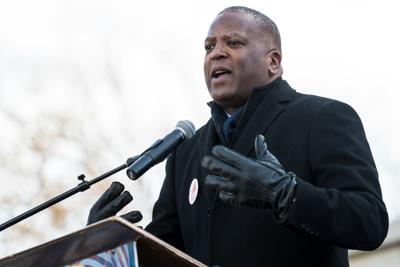At the time, it likely seemed like an odd move to some.
In November, third-term Columbia Mayor Steve Benjamin announced he would be supporting billionaire former New York City Mayor Mike Bloomberg in his run for the Democratic nomination for president.
It was an interesting play for Benjamin, who’s had a decade-long run as the first African American mayor of South Carolina’s Capital City and gained a national profile from his leadership in the U.S. Conference of Mayors, among other efforts. After all, Benjamin’s endorsement was coveted in the state’s Feb. 29 “First in the South” Democratic presidential primary, and Bloomberg chose not to participate in South Carolina, or any of the other early voting states, instead spending his time — and hundreds of millions of dollars — focusing on the Super Tuesday states.
However, three months later, Benjamin’s decision to back the former New York mayor looks prescient. Bloomberg has rocketed up the polls, with a Feb. 18 Marist poll showing him in second place nationally at 19 percent, trailing only progressive Vermont Sen. Bernie Sanders (31 percent) and sitting ahead of former Vice President Joe Biden (15 percent). Various polls have shown Bloomberg at or near the top among Democrats in states like Florida, Oklahoma and Arkansas.
While Democratic leaders across South Carolina have thrown their support behind various candidates who are fighting it out in South Carolina’s Feb. 29 primary, Benjamin essentially stood alone for months as a notable Palmetto State elected official backing Bloomberg. Democratic state House Minority Leader Todd Rutherford came along on Feb. 19, announcing he, too, would back the billionaire former NYC mayor, saying he believes that Bloomberg is the only candidate in the Democratic field who can beat Republican President Donald Trump in November
Antjuan Seawright, a longtime Columbia Democratic strategist and a CBS political pundit, notes Benjamin’s support of Bloomberg, which seemed unconventional in November, has taken on a different appearance as the billionaire has asserted himself in the Democratic fray.
“Our mayor has always been a visionary leader,” Seawright says. “And sometimes he has a vision that is beyond the moment. And this, perhaps, could be one of those scenarios where he played a longer game and it worked out for him. Or it could be a situation where he misread the tea leaves. Either way, at the end of the day I don’t think the mayor loses anything.”
Benjamin, who spoke at the 2016 Democratic National Convention and, as revealed through a WikiLeaks hack of Hillary Clinton’s campaign manager, was on a “first cut” list of possible candidates for vice president in 2016, is a national co-chair of Bloomberg’s campaign. He tells Free Times he’s long thought Bloomberg would have a candidacy that resonates with voters.
“I saw in Mike an exceptional candidate who distinguished himself in the private sector and public sector,” Benjamin says of Bloomberg, who has amassed a fortune north of $60 billion. “He’s one of the greatest philanthropists of our time. He’s invested not just in important issues, but in incredibly difficult issues: Ending gun violence, fighting climate change. Issues that a reasonable person could argue are the existential threats of our times.”
Bloomberg, 78, was New York’s mayor from 2002 to 2013. His political party affiliation has bounced around through the years, as he was a lifelong Democrat before registering as a Republican before the 2001 New York mayoral race. He later switched to being an independent before re-registering as a Democrat in 2018.
The billionaire has faced sharp criticism from Democratic opponents as he has become viable in the race. Massachusetts U.S. Sen. Elizabeth Warren sent a withering shot across his bow at a Feb. 19 debate in Las Vegas, saying, “I’d like to talk about who we’re running against: A billionaire who calls women fat broads and horse-faced lesbians, and no I’m not talking about Donald Trump, I’m talking about Mayor Bloomberg.” The barb was an apparent reference to comments that have been attributed to Bloomberg in a book.
And opponents have taken Bloomberg to task on his past record, perhaps most pointedly as it relates to the controversial “stop and frisk” police tactics during his time as New York’s mayor. The practice, which gave officers wide berth to stop and search people they thought might be involved in criminal activity, had an overt impact on black and Latino citizens.
The stop and frisk element raised concerns for some leaders in South Carolina. Democratic state Rep. Kambrell Garvin, of Columbia, says it gives him pause.
“I think Michael Bloomberg has the money and the resources to compete,” says Garvin, who is supporting Warren in the primary. “But, there are a lot of folks my age who are concerned with his policy on stop and frisk. He’s going to have to answer those questions about things he has done in the past.”
Bloomberg apologized publicly in November for the controversial policing tactic. Benjamin concedes that piece of Bloomberg’s record has given him some heartburn.
“I told Mike very early on that was a threshold issue for me,” Benjamin says. “But people have to look at any leader in their totality. You look at the successes and the failures. We do not have a perfect candidate for president on either side of the aisle.”
Benjamin notes murders and incarceration rates dropped sharply during Bloomberg’s time as New York’s mayor.
“You take that and you see a man who was fundamentally committed to ending violence and creating safer communities,” Benjamin notes. “But stop and frisk was not the answer. I know he would tell you that was one of the most significant mistakes in leadership.”








